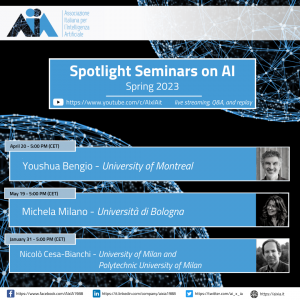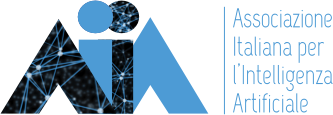Spotlight Seminars on AI – Spring 2023
 The Italian Association for Artificial Intelligence is pleased to announce the Spring 2023 program of the Spotlight Seminars on A. The aim of the seminars is to illustrate, explore and discuss current scientific challenges, trends, and possibilities in all branches of our articulated research field. The seminars will be held virtually (https://www.youtube.com/c/AIxIAit), on a monthly basis, by leading Italian researchers as well as by top international scientists. The seminars are mainly aimed at a broad audience interested in AI research, and they are also included in the Italian PhD programme in Artificial Intelligence; indeed, AIxIA warmly encourages the attendance of young scientists and PhD students.
The Italian Association for Artificial Intelligence is pleased to announce the Spring 2023 program of the Spotlight Seminars on A. The aim of the seminars is to illustrate, explore and discuss current scientific challenges, trends, and possibilities in all branches of our articulated research field. The seminars will be held virtually (https://www.youtube.com/c/AIxIAit), on a monthly basis, by leading Italian researchers as well as by top international scientists. The seminars are mainly aimed at a broad audience interested in AI research, and they are also included in the Italian PhD programme in Artificial Intelligence; indeed, AIxIA warmly encourages the attendance of young scientists and PhD students.
The “Spring 2023” edition features 3 seminars:
- Youshua Bengio, University of Montreal
- April, 20 – 5:00PM (CEST)
- Title: Towards Large Neural Networks that can Reason
- Abstract: Current neural networks, such as large language models and those based on images or paired images and text, are trained to fit their training data, with very little in their architecture that could force them to produce answers that are coherent with respect to individual pieces of knowledge. In that sense, they seem to be missing some of the reasoning abilities and causal understanding that humans can benefit from, and this may result in incoherent outputs and mistakes that humans would typically not make, especially out-of-distribution. This raises the larger question of how higher-level cognitive abilities could be incorporated in deep learning. We know a lot from neuroscience and cognitive science about them and that can be used to design new architectures and training frameworks with the corresponding inductive biases. This has motivated a novel form of deep learning called generative flow networks or GFlowNets, borrowing from reinforcement learning, generative models and amortized variational inference. GFlowNets can sequentially generate compositional data structures whose content may be analogous to our thoughts, and they can be trained to sample them with probability proportional to some given or learned reward function that corresponds with the coherence of the context and generated answer with a structured world model. A GFlowNet can thus be trained to perform amortized probabilistic inference that is consistent with the pieces of knowledge of the world model, including in the sense of generating samples from a Bayesian posterior over world models. Like with amortized variational methods, this can be used to learn the world model itself. That arrangement is similar to model-based reinforcement learning (where we separate the policy from the world model) but concerns the learning of a policy that chooses what internal computation (i.e. reasoning) to perform, rather than acting in the world. Unlike with state-of-the-art deep learning and reinforcement learning, this makes it easy to incorporate inductive biases about high-level cognition and causality in the world model itself, such as sparse causal dependencies and reusable modular pieces of knowledge. It means that the GFlowNet probabilistic inference machine can be trained by querying the world model, without having to directly interact with the real world, and can be as large and trained with as many queries as our computational capabilities allow: unlike current deep nets, its effective capacity is not limited by the size of the externally observed data. This is convenient because probabilistic inference is generally intractable and may thus require high capacity in order to be approximated with a fast neural net. The mathematical foundations of GFlowNets and how they constitute an interesting ML-based alternative to MCMC inference will be briefly explained and recent work on GFlowNets highlighted.
- Bio: Yoshua Bengio is recognized worldwide as one of the leading experts in artificial intelligence, known for his conceptual and engineering breakthroughs in artificial neural networks and deep learning. He is a Full Professor in the Department of Computer Science and Operations Research at Université de Montréal and the Founder and Scientific Director of Mila – Quebec Artificial Intelligence Institute, one of the largest academic institutes in deep learning and one of the three federally-funded centers of excellence in AI research and innovation in Canada. He began his studies in Montreal, where he obtained his Ph.D. in Computer Science from McGill University in 1992. After completing a postdoctoral fellowship at the Massachusetts Institute of Technology (MIT) on statistical learning and sequential data, he completed a second postdoc at AT&T Bell Laboratories, in Holmdel, NJ, on learning and vision algorithms in 1993. That same year, he returned to Montreal and joined UdeM as a faculty member. In 2016, he became the Scientific Director of IVADO. He is Co-Director of the CIFAR Learning in Machines & Brains program that funded the initial breakthroughs in deep learning and since 2019, holds a Canada CIFAR AI Chair and is Co-Chair of Canada’s Advisory Council on AI. In 2022, Yoshua Bengio became the most cited computer scientist in the world (h-index). Concerned about the social impact of AI, he actively took part in the conception of the Montreal Declaration for the Responsible Development of Artificial Intelligence. His goal is to contribute to uncovering the principles giving rise to intelligence through learning while favouring the development of AI for the benefit of all. Yoshua Bengio was made an Officer of the Order of Canada and a Fellow of the Royal Society of Canada in 2017 and in 2020, became a Fellow of the Royal Society of London. From 2000 to 2019, he held the Canada Research Chair in Statistical Learning Algorithms. He is a member of the NeurIPS Foundation advisory board and Co-Founder of the ICLR conference. His scientific contributions have earned him numerous awards, including the 2019 Killam Prize for Natural Sciences, the 2017 Government of Québec Marie-Victorin Award, the 2018 Lifetime Achievement Award from the Canadian AI Association, the Prix d’excellence FRQNT (2019), the Medal of the 50th Anniversary of the Ministry of International Relations and Francophonie (2018), the 2019 IEEE CIS Neural Networks Pioneer Award, Acfas’s Urgel-Archambault Prize (2009) and in 2017, he was named Radio-Canada’s Scientist of the Year. He is the 2018 laureate of the A.M. Turing Award, “the Nobel Prize of Computing,” alongside Geoffrey Hinton and Yann LeCun for their important contributions and advances in deep learning. In 2022, he was appointed Knight of the Legion of Honor by France and named co-laureate of Spain’s Princess of Asturias Award for technical and scientific research.
- Michela Milano, Università di Bologna
- May, 19 – 5:00PM (CEST)
- Title: Integrating Learning, Optimization and Reasoning
- Abstract: In the last decade we have seen a surge in methods that merge learning, optimization and reasoning. The main motivation behind this line of research comes from the need to produce decision models merging data-driven and knowledge-based components. The interaction between these methods can be obtained in two directions: the former relies on the integration of machine learning models into optimization or decision support tools, the latter is based on the injection of domain knowledge coming from human experts into machine learning models. In the talk two approaches will be presented along with a discussion on use cases that benefit from the integration.
- Bio: Michela Milano is full professor of Artificial Intelligence at DISI – University of Bologna and she chairs the interdepartmental Institute of Human-Centered Artificial Intelligence counting 27 Departments and more than 400 researchers. She is past Deputy President of the European Association of Artificial Intelligence (EurAI) and past Executive Councilor of the Association for the Advancements of Artificial Intelligence (AAAI), past member of the Executive Committee of the Association for Constraint Programming and of the Italian Association of Artificial Intelligence. Her research activity concerns Artificial Intelligence with particular focus on decision support and optimization systems. In this field Michela Milano has written more than 170 papers on peer reviewed international conferences and journals. She coordinated many European scientific and industrial projects.
- Nicolò Cesa-Bianchi, University of Milan and Polytechnic University of Milan
- June, 22– 5:00PM (CEST)
- Title: Online learning, bandits, and digital markets
- Abstract: Online learning is concerned with the study of algorithms that learn sequentially through repeated interactions with an unknown environment. The goal is to understand how fast an agent can learn depending on the information received from the environment. Digital markets, with their complex ecosystems of algorithmic agents, provide countless examples of sequential decision-making problems with different utility functions and types of learning feedback. In the talk, after tracing the roots and the main algorithmic ideas behind online learning, we will show how solving problems arising from digital markets has improved our understanding of what machine learning algorithms can do.
- Bio: Nicolò Cesa-Bianchi is professor of Computer Science at the University of Milan and holds a joint appointment at Polytechnic University of Milan, Italy. His main research interests are the design and analysis of machine learning algorithms for online learning, sequential decision-making, and graph analytics. He is co-author of the monographs “Prediction, Learning, and Games” and “Regret Analysis of Stochastic and Nonstochastic Multi-armed Bandit Problems”. He served as President of the Association for Computational Learning and co-chaired the program committees of some of the most important machine learning conferences. He is the recipient of a Google Research Award, a Xerox Foundation Award, a Criteo Faculty Award, a Google Focused Award, and an IBM Research Award. He is ELLIS fellow, member of the ELLIS board, and co-director of the Milan ELLIS unit.
